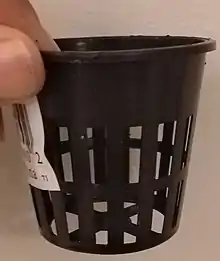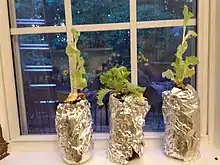Kratky method
The Kratky method is a passive hydroponic technique for growing plants suspended above a reservoir of nutrient-rich water.[1] Because it is a non-circulating technique, no additional inputs of water or nutrients are needed after the original application, and no electricity, pumps, or water and oxygen circulation systems are required.[2] The Kratky method has applications both for commercial food production and as a small-scale and low-maintenance technique for home growers.[3] It has been described as "the simplest hydroponic system."[4]
Description

Plants are placed in net cups filled with an inert growth medium such as rock wool, expanded clay aggregate, sphagnum moss, or coconut coir.[5][6] The net cups are suspended above a reservoir of water containing essential nutrients in solution.[7] Only the root tips are allowed to touch the surface of the reservoir. As the plant grows and depletes the water level, a gap of moist air will form and expand between the water surface and the base of the plant. The roots in this gap become laterally branching "oxygen roots," and absorb oxygen from the air inside the container.[8] By the time the water level is fully depleted, the plant should be ready to harvest. Thus, in one growing cycle, no additional replenishment of water or nutrients is needed beyond the initial application.[9]

The method is named after Bernard Kratky, a researcher at the University of Hawaii, who first proposed the method in the journal Acta Horticulturae in 2009.[2] In the article, Kratky discusses using floating pallets for commercial food production. Multiple plants are placed in net pots on boards that float atop a shared reservoir, with support beams slightly underneath the water level. As water is depleted, the boards eventually come to rest on the support beams, providing an air gap to allow oxygen intake.[2] The Kratky method has also found popularity among home growers, and is often carried out on smaller scales in containers such as buckets and mason jars.[10] The technique is designed for leafy vegetables that do not consume large amounts of water, so the water supply does not need to be continually replenished.
See also
References
- Arun Maurya; et al. (2017). "Study of Hydroponic Systems and their Variations". International Journal of Agricultural Science and Research. 7 (5): 547–556. doi:10.24247/ijasroct201764. ISSN 2250-0057.
- Kratky, B.A. (2009). "Three Non-Circulating Hydroponic Methods for Growing Lettuce". Acta Horticulturae (843): 65–72. doi:10.17660/actahortic.2009.843.6. ISSN 0567-7572.
- Kratky, Bernard (September 2010). "A suspended Net-Pot, Non-circulating Hydroponic Method for Commercial Production of Leafy, Romaine, and Semi-Head Lettuce". Vegetable Crops. 1.
- Atkinson, Nigel (5 July 2018). "Hydroponics: Should We Think Small?" (PDF). CPQ Nutrition. 1 (3): 8.
- Arancon, Norman Q.; Schaffer, Nicholas; Converse, Chad E. (2015-07-03). "Effects of Coconut Husk and Sphagnum Moss-Based Media on Growth and Yield of Romaine and Buttercrunch Lettuce ( Lactuca Sativa ) in a Non-Circulating Hydroponics System". Journal of Plant Nutrition. 38 (8): 1218–1230. doi:10.1080/01904167.2014.983117. ISSN 0190-4167. S2CID 96894960.
- Takeuchi, Y. (2019). "3D Printable Hydroponics: A Digital Fabrication Pipeline for Soilless Plant Cultivation". IEEE Access. 7: 35863–35873. doi:10.1109/ACCESS.2019.2905233. ISSN 2169-3536. S2CID 88483258.
- Arancon, Norman Q.; Owens, John Dean; Converse, Chad (2019-11-26). "The effects of vermicompost tea on the growth and yield of lettuce and tomato in a non-circulating hydroponics system". Journal of Plant Nutrition. 42 (19): 2447–2458. doi:10.1080/01904167.2019.1655049. ISSN 0190-4167. S2CID 202033113.
- Imai, Hideo (1987). "AVRDC non-circulating hydroponic system". Proc. Symposium on Horticultural Production Under Structure. Taiwan Agr. Res. Inst. Taichung.
- Mahlangu, R. I. S.; Maboko, M. M.; Sivakumar, D.; Soundy, P.; Jifon, J. (2016-10-14). "Lettuce ( Lactuca sativa L.) growth, yield and quality response to nitrogen fertilization in a non-circulating hydroponic system". Journal of Plant Nutrition. 39 (12): 1766–1775. doi:10.1080/01904167.2016.1187739. ISSN 0190-4167. S2CID 98992424.
- Martin, Colin (2019). Towards a Hydroponic Architecture (Thesis). University of Cincinnati.